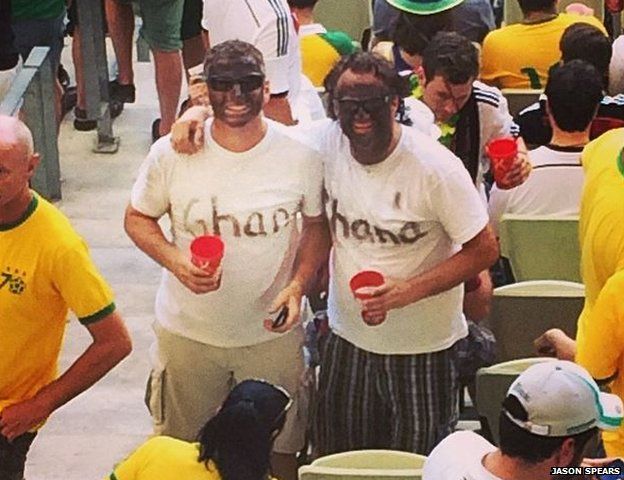#BBCtrending: Is it always racist to black up your face?
- Published

It was widely reported that these men were German, but their nationality has not yet been confirmed
All week, images of "blacked-up" fans at the Germany v Ghana game have been causing outrage around the world - everywhere but Germany.
Here is how it began: "I was pretty upset. I was angry," is how Jason Spears, a lawyer from Alabama, describes his reaction when he encountered the first of a total of eight fans with blacked-up faces at last weekend's Germany-Ghana World Cup match. There were even people lining up to take photos with a group of them, he says. Spears, who is African-American, confronted some of the men and told them - in no uncertain terms - just how offensive and racist he found their behaviour. The response from them, he says, was one of bewilderment.
Spears later found himself sitting close to two more fans with blacked-up faces and T-shirts with "Ghana" written on them. He assumed they were Germans dressed up to taunt the opposition. He grabbed a quick photo and posted it to his Instagram page, external. Over the following days, global outrage spread. Spears's post was widely shared, and reposted on Twitter and Facebook.
There were tens of thousands of comments on social media - including 10,000 tweets using the hashtag #blackface, external. Most came from the US and were highly critical - slamming the men in the image as "racist", and calling on football's world governing body Fifa to investigate. Fifa initially considered opening a disciplinary case, but told BBC Trending it had decided not to pursue it.
But as the global conversation continued, nuances and cracks started to appear. Firstly, though Spears believed the men in the photo to be German, others on social media suggested they may have been Swiss fans there to support Ghana. One theory is that their "blacking-up" was a well-intentioned - albeit clumsy - gesture. For Spears, regardless of where they were from, or who they were supporting, they were representing an offensive "caricature". "If you want to cheer for Ghana, you can wear a Ghana shirt," he says.
In the US, blackface is associated with minstrel shows - like this one from 1931
In Germany itself, there was relatively little discussion of the image on social media or the mainstream media in the country. But what debate there was, was completely different in tenor.
"No-one wants racism, but you have to ask, 'Is this really racism?'" says Sascha Michel, who teaches at the University of Koblenz in Germany, and tweeted about the image. Dressing up is common at carnival time, Karneval, in Germany. People dress up as all sorts of things, he says - police officers, sailors and animals, for example, as well with blacked-up faces. He sees no difference between them, and argues that people who criticise blacking up are being politically correct.
Some on social media began to share an image of a black fan with white facepaint at a World Cup game, using the hashtag #whiteface, external, and questioned - perhaps ironically - whether that was racist too.
This image - and similar ones - were also widely shared online
"People in Germany, they think it's funny," says Mo Asumang a German-Ghanaian film-maker who recently made a documentary about race in the US and Germany. Germans don't necessarily know about the minstrel shows in the US where white actors where blacked up to play black people - who were portrayed as stupid, lazy and a whole range of other racist and negative stereotypes - she says.
In Germany, people are only just starting to question, external, and feel uncomfortable, about blackface. "I would say it's very important now for other countries to help us a bit in this debate," says Asumang. Just last year, Germany's Chancellor Angela Merkel was photographed, external beside some blacked-up children taking part in Three Kings Day, where - in Germany - it is traditional for some of the children to black up to represent one of the kings.
Angela Merkel has been photographed more than once beside a child in blackface - this image is from 2009
Perhaps more worrying, says Asumang, was a handful of extremely racist tweets from Germans during the Ghana match. One read: "Hopefully a few men will die of Aids in the middle of the field." Others made references to slavery.
Germany is far from being the only country in Europe where it's sometimes socially acceptable to black up. The Netherlands has Santa Claus's sidekick Black Pete, external, who is played by a white person with a blacked-up face. A group of police officers in France caused controversy, external earlier this month when they turned up at a party in blackface.
Reporting by Cordelia Hebblethwaite, external
There's more on this story on BBC Trending radio on BBC World Service on Saturday at 11:30 BST (10:30 GMT). You can listen here, or download the podcast.